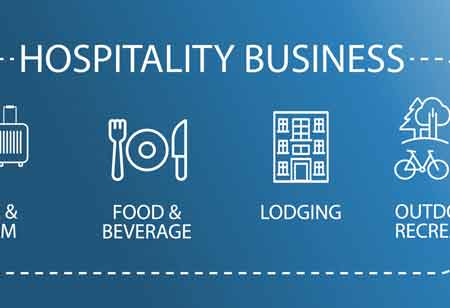Thank you for Subscribing to Hospitality Business Review Weekly Brief
Shaping the Future of Hospitality Media Communication

By
Hospitality Business Review | Thursday, March 27, 2025
Stay ahead of the industry with exclusive feature stories on the top companies, expert insights and the latest news delivered straight to your inbox. Subscribe today.
The hospitality industry, always one of the most dynamic sectors in the global economy, has seen its media communication services evolve drastically in recent years. Driven by new digital innovations and changing consumer behaviors, this sector is navigating a variety of trends and challenges. Media communication services for hospitality—ranging from digital marketing to customer relations—are crucial in shaping customer experiences, and as the competition intensifies, companies must innovate at every turn to maintain relevance and success.
Navigating Shifting Trends in Hospitality Media Communication
Over the past few years, digital transformation has become a driving force within the hospitality sector. As customers become increasingly tech-savvy, the demand for personalized, seamless communication has skyrocketed. Old marketing efforts have taken a backseat to innovative digital solutions, as companies now invest heavily in data analytics, social media, and automated platforms to create highly tailored customer experiences.
One of the most significant shifts is the increasing reliance on social media platforms to engage with customers. Hospitality companies are utilizing platforms such as Instagram, Facebook, and Twitter not just for promotions but as real-time communication channels that offer more dynamic, interactive relationships with their guests. User-generated content, influencer partnerships, and reviews have emerged as powerful tools, amplifying brand visibility and establishing authentic connections with prospective clients.
In tandem with this rise in social media engagement, there’s been a notable shift towards content marketing. Media communication services in hospitality are now focusing more on storytelling—crafting narratives that resonate emotionally with potential guests. This trend is seen across blogs, podcasts, videos, and even virtual tours that immerse consumers in unique experiences before they even step foot in the property. As technology evolves, so does the ability to bring virtual experiences closer to reality, blurring the lines between digital and physical spaces.
Addressing the Challenges of Connectivity and Privacy
While the future looks promising, the hospitality media communications sector faces several challenges that require adaptive, innovative solutions. One of the most pressing concerns is the challenge of managing data privacy and security. With the rise of personalization, companies are collecting vast amounts of guest data. While this data can provide invaluable insights, it also raises serious privacy concerns. Striking the balance between effective communication and safeguarding customer privacy is paramount. Numerous hospitality media communication companies are investing in more secure data systems, adopting encryption technologies, and ensuring compliance with increasingly strict data protection regulations.
Connectivity is another challenge. As more customers expect constant online access, the demand for reliable and high-speed connectivity within hotels, resorts, and other hospitality venues continues to rise. Providing seamless Wi-Fi services has become a critical part of a guest’s experience, influencing their choice of accommodations. However, maintaining a robust digital infrastructure while controlling operational costs poses a significant challenge. To address this, many companies are turning to advanced network management systems and more sustainable technological solutions to ensure their services meet customer expectations without breaking the bank.
Another ongoing challenge is ensuring consistent and impactful communication across a variety of channels. With the sheer volume of communication options—ranging from emails, apps, social media, and chatbots—it can be difficult for companies to deliver a cohesive, consistent message. Companies are now exploring integrated communication platforms that allow for omnichannel experiences, ensuring that every interaction is part of a unified brand message. These platforms serve as a centralized hub for managing all customer interactions, making it easier to maintain personalized, responsive, and effective communication strategies.
Seizing New Opportunities through Innovation
The hospitality media communication sector is brimming with opportunities as businesses embrace new technologies to enhance customer engagement and streamline operations. The increased AI adoption and machine learning is one key innovation, allowing businesses to personalize the guest experience more effectively. AI-driven chatbots, for instance, offer 24/7 interaction, providing instant responses while also gathering valuable insights into customer preferences. This enables businesses to create more tailored, meaningful interactions with guests.
Mobile technology is another major opportunity, with mobile-first strategies becoming a necessity for hospitality companies. Many businesses are developing mobile apps that not only facilitate booking and check-in but also enhance the guest experience with in-room service requests and personalized promotions. These applications offer a direct communication channel between guests and businesses, enabling real-time feedback and ongoing improvement based on user interactions.
The sector is also seeing an increased demand for sustainability, with eco-friendly practices and green marketing strategies becoming central to hospitality communications. As consumers, particularly millennials and Gen Z, prioritize environmental responsibility, hospitality media companies are aligning their messages with these values to build brand loyalty. Furthermore, advancements in immersive technologies like virtual reality (VR) and augmented reality (AR) are providing businesses with new ways to engage potential customers, offering virtual hotel tours and interactive experiences that attract and retain guests.







